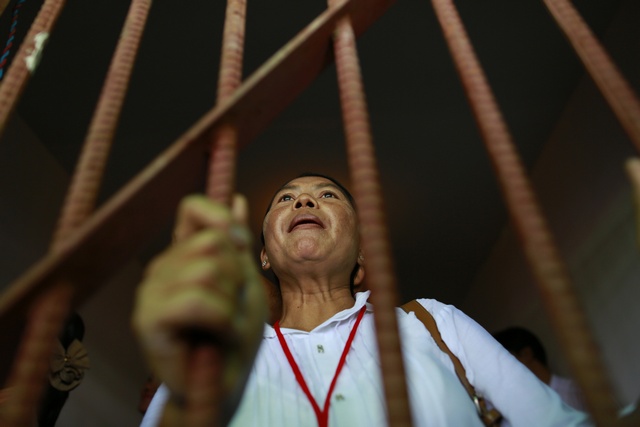When President Thein Sein promised in July that Burma would release all political prisoners by the end of 2013, he was widely taken at his word. After all, not only was the country striding forward in an economic sense, but its parliament was functioning with the active participation of the country’s most famous former prisoner, Aung San Suu Kyi.
Of the conditions laid down for the lifting of western sanctions – an end to the civil war; a halt to human rights abuses, especially in ethnic areas; a humane resolution to the Rohingya crisis; and the release of all prisoners of conscience – it was the latter requirement that should have been easiest to fulfill.
The Burmese president was of course speaking in London at the time and his words were mostly targeted at countries which were looking for any excuse to call an end to sanctions and allow their national entrepreneurs access to Burma’s abundant but largely untapped markets.
“By the end of the year there will be no prisoners of conscience in Myanmar [Burma],” said Thein Sein on 15 July following a meeting with British Premier David Cameron. He was immediately lauded at home and abroad. A week later 73 political prisoners were released.
Yet despite the presidential guarantee and the formation of a commission to adjudicate each of the 200 individual cases, progress has been painfully slow.
Burma’s security forces appear particularly recalcitrant to change. Arrests continue, mostly of peaceful protestors. Ironically they even detained demonstrators who were protesting for the right to protest just a few weeks ago.
But while riot police have no hesitation in viciously attacking unarmed monks and activists at Latpadaung, they sit idly by while individual Muslims are lynched to death in the street. Such attitudes make a mockery of the institution of policing. Burma’s government must make a sustained effort to call officers and superiors to account for the actions of their subordinates in the field.
The most recent high-profile arrest was that of veteran activist Naw Ohn Hla, a former political prisoner who was detained for leading a demonstration against the controversial Latpadaung copper mine. Last week she was sentenced to two years for sedition – a draconian judgement that echoed of some barbarous bygone age.
In May, the Assistance Association for Political Prisoners (AAPP), based in Thailand, listed the names of 183 political prisoners across Burma. The organisation’s joint-secretary, Bo Kyi, updated those numbers to DVB on Wednesday – 122 political prisoners already sentenced, another 120 awaiting trial.
What is immediately clear to everyone is that even if the Burmese president grants amnesties to each and every one of those detainees before the year’s end, he will not have fulfilled his promise if he simply refills those jail cells with other activists, especially peaceful demonstrators protesting for the rights of others, such as in the case of Naw Ohn Hla who was supporting displaced farmers.
“Naw Ohn Hla’s sentencing is a disgraceful example of the still oppressive legal system in Burma, the distortion of the rule of law by the authorities, and vested interests, and how local authorities have contempt for the everyday grievances of the people,” said David Mathieson, the senior researcher on Burma for Human Rights Watch.
[related]
Of the 183 individuals considered political prisoners by AAPP, at least 57 belong to ethnic militias. This poses a fresh question – should captured armed insurgents with rifles be listed alongside street protestors with placards? AAPP tends to think so, saying that they regard both peaceful demonstrators and ethnic freedom fighters as political prisoners.
Mathieson offers a slightly different stance. “Human Rights Watch doesn’t include members of armed groups in our definition of a political prisoner, which we see as people involved in peaceful political activities around basic freedoms, but that doesn’t mean we don’t call for their release if it is part of a process of national reconciliation.”
Therein lies an appropriate solution for the Burmese government – the fact that they can offer the release of detained Kachin, Shan and Karen insurgents as a gesture towards a peace process or as a concession when signing a ceasefire with the various armed groups.
Either way, the Burmese government must fulfill its obligations, and it must desist from re-arresting those it releases or replacing them with other politicians and activists, no matter how outspoken or how reprehensible and shrill their words are to Naypyidaw’s ears.
As for the prisoners themselves, they should be afforded compassion and funding to help them rehabilitate when they finally see the light of day again.
As a reminder, take the case of Gambira, the charismatic former monk who was one of the leaders of the Saffron Revolution in 2007 and later sentenced to 68 years in prison for his role in the movement.
According to the Prisoners of Conscience Appeal Fund: “Whilst in detention he [Gambira] was tortured both physically and psychologically. In the evenings the prison guards would come to his cell, put a black bag on his head, stuff a cloth in his mouth, handcuff his wrists and chain his feet to the floor, then hit him repeatedly over the head with wooden batons. He would then be interrogated all night under harsh spotlights.”
These barbaric practices need to be ended once for all. Security forces must be ordered to practice control but not brutality. If a need arises to detain activists or break up protests for security reasons, it must be exercised in a humane manner. Never should innocent persons of conscience and compassion such as Naw Ohn Hla see the inside of a courtroom, never mind a prison cell.
Thein Sein must proclaim unconditional releases and assure dissidents that their civic rights will be protected. By showing himself to be magnanimous, Thein Sein can take large strides towards national reconciliation.



